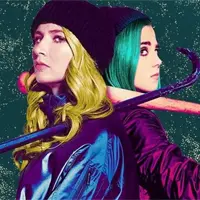Why haven't we seen a flood of #MeToo-inspired shows?
-

Friday was the one-year anniversary of The New York Times publishing its Harvey Weinstein bombshell story that led to the take down of many powerful men accused of sexual misconduct. In the past year, TV shows from GLOW to Jessica Jones to BoJack Horseman have added #MeToo subplots. Even Brooklyn Nine-Nine has a #MeToo-themed episode in the works. "So why haven’t we seen a flood of new #MeToo and Time’s Up-inspired series unfurling across the TV landscape yet?" wonders Joy Press. "One reason is that shows take a long time to incubate; another might be that TV executives were slow to absorb the enormity of the tectonic shift the country was undergoing, and quick to assume that it would not be a lasting phenomenon." She adds: "Ironically, a handful of shows fueled by female rage and trauma appeared just before #MeToo got rolling—and then disappeared. I’m thinking of series like MTV’s Sweet/Vicious, a short-lived black comedy about two college students who become vigilantes avenging campus rapes, and Amazon’s One Mississippi with Tig Notaro as a comedian who has returned to her childhood home to sift through the sexual trauma of her youth. Both series were canceled too soon." A similar fate befell I Love Dick and the recently canceled Dietland. Sweet/Vicious creator Jennifer Kaytin Robinson creator, who is resurrecting her MTV show as a comic book, says she pitched a show about women taking down a toxic boss right around the time of the Louis CK scandal. But a male executive told her, “this won’t be on the air for another 12 to 18 months; do you still think it’s going to be relevant? Because it seems like it’s getting so much better now.” There are some #MeToo-inspired shows in the pipeline, including Netflix's Unbelievable, based on the Pulitzer-winning article An Unbelievable Story of Rape, as well as Hulu's Shrill, starring Aidy Bryant. One unnamed female showrunner tells Press that many TV executives still feel uncomfortable giving female creators too much room to expand portraits of women. “Women’s anger could make for good television, but it means the industry is going to have to shift and trust a woman to articulate that anger,” says the anonymous showrunner. “It still feels like the definition of relatability for female characters is (that) you have to be a perfect martyr, like Elisabeth Moss’ character in The Handmaid’s Tale.”
ALSO:
TOPICS: Sexual Misconduct, One Mississippi, Sweet/Vicious, Unbelievable, Harvey Weinstein, Jennifer Kaytin Robinson, Time's Up
More Sexual Misconduct on Primetimer:- Who did Mario Rodriguez play in Boo A Madea Halloween? Details of $77 million lawsuit filed against Tyler Perry explored
- From sexual misconduct lawsuit to removal from films over harassment allegations: Andy Dick controversies explored amid latest medical emergency
- Who is Yi Zhou? Jeremy Renner allegations explored as ICE controversy erupts against Marvel star
- What are the Vulvodynia band allegations? All about the South African death metal group as vocalist Zion Bittenbender issues statement
